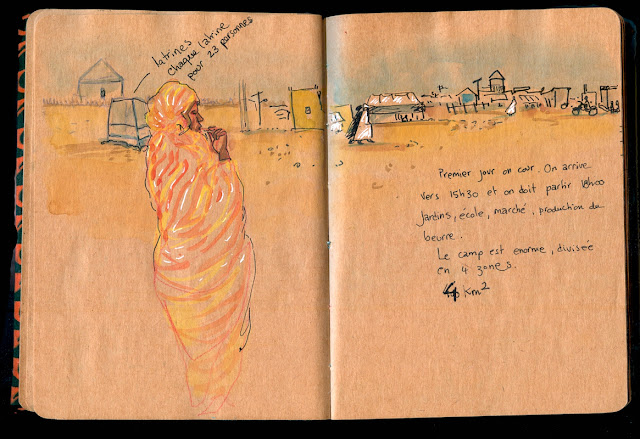 |
| Hawker beechcraft, plane and pilots from South Africa |
I was invited by the Portuguese electronic newspaper
e-Global to join a journalist and a photographer on their visit to the refugee camps of Mali in theSouth-East of Mauritania, close to the Malian frontier. Its the
UNHCR that arranges and in a way controls our visit.
Tuesday 22 march we board this small plane (19 seats) in Nouakchott towards the village of
Bassikounou. It will be approximately two hours flight to
Nema, small stop of 30 minutes to fuel and another 30 minutes flight.
 |
| Re-fueling at the airport in Nema |
Nema was being prepared to be a regional airport where charter flights would start around 2007/8 to expand tourism around the area specially to the Ancient Caravan Village of
Walata (you can find the drawings of my visit in 2005 in this link). In 2008 Mauritania is considered a dangerous country to visit and placed in red alert and since then they're having less and less visitors.
Nema is a ghost airport.
 |
| Aid workers from different organisations |
As we start going down in Bassikounou, a filter of dust lingers in the air, golden, trees, specially acacias speckle this landscape where ochre and reds predominate. The landing strip is of red earth and UN cars are waiting for us and for the International Organisations workers.
 |
| security briefing with Coronel Jileni Abdelli |
On arrival, first thing we had was a security briefing. I though this coronel was going to teach us what to do in case of attack or kidnapping, but no. He just told as the measures they take, convoy towards and back to the camps and that we we're not allowed in town after 9.30pm.
 |
| first meal at Bassikounou |
As the journalist and photographer have only this afternoon and a few hours in the morning (of Wednesday) before flying back to Portugal. we're served lunch and have the opportunity to exceptionally visit the camps from 3.30pm to 6pm. My marathon of fast sketching is about to start.
 |
| vegetable gardens |
 |
| young and old water the vegetable gardens twice a day |
Our first visit was to the vegetable gardens of M'Bera. A local ONG called SOS Desert (no information at all in the net but she's mentioned by HCR) is very present in the camps, rubbish collecting, vegetable gardens and relations with refugees and local population.
The local population in this area of Mauritania suffers regularly from famine and their conditions of living are as fragile as the refugee ones, the only difference being of course, that they're in their home land and they have their national papers. Many of this population have cattle 8 cows, goats, sheep and camels. The refugee camp has brought some amelioration in their lifes, we'll see that further along.
We were visiting late March and we could see aubergines, tomatoes, carrots, and other vegetables growing, lots of mint that it is used in the tea making. But at the end of April the heat will be so strong that nothing will grow until November/ December.
 |
| adult literacy classes |
Adult literacy classes are done in the different languages spoken in Northern Mali. Hal Pulaar ( fulanis ), Arabic (Maures), Tamachec (touaregues) and Songhai. The classes are mixed but women outnumber men. The learning system is by repetition out loud what the teacher says.
 |
| Children form everywhere love being drawn |
Outside children that are following us out of curiosity repeat the lesson as well.
 |
| view of the camp and children |
This is the last drawing of this first day. A motorbike quickly done. We're not used to listen to motos in Mauritania, they're just starting to be seen in Nouakchott but they're still rare. On the contrary Maliens love them. And they're all over the country and now you hear them and see them in M'bera camp and in Bassikounou.












Grande reportagem. Belíssimos.
ReplyDeleteobrigada os próximos dias no campo de refugiados em breve
Deleteun très joli reportage , sobre mais très efficace !
ReplyDelete